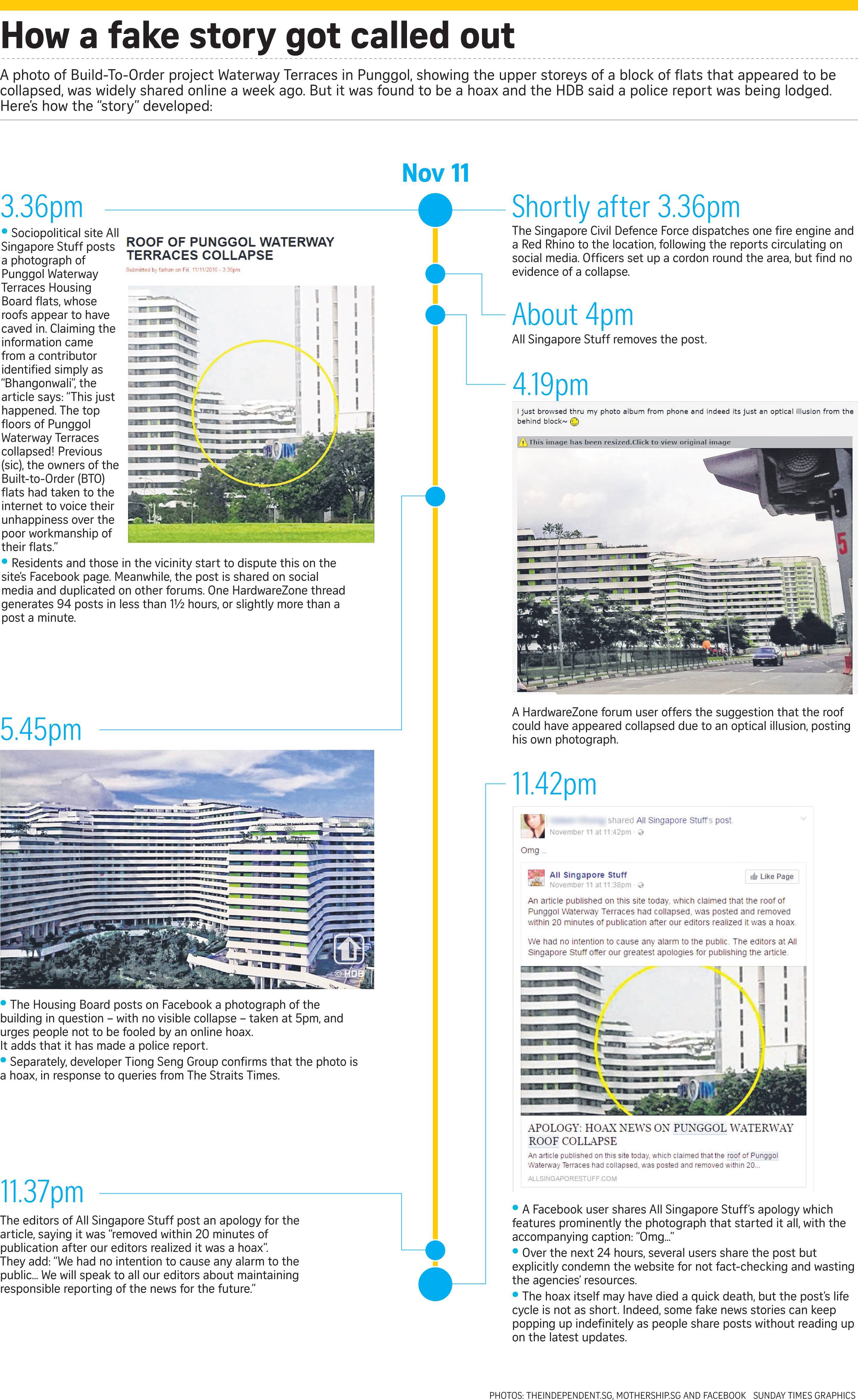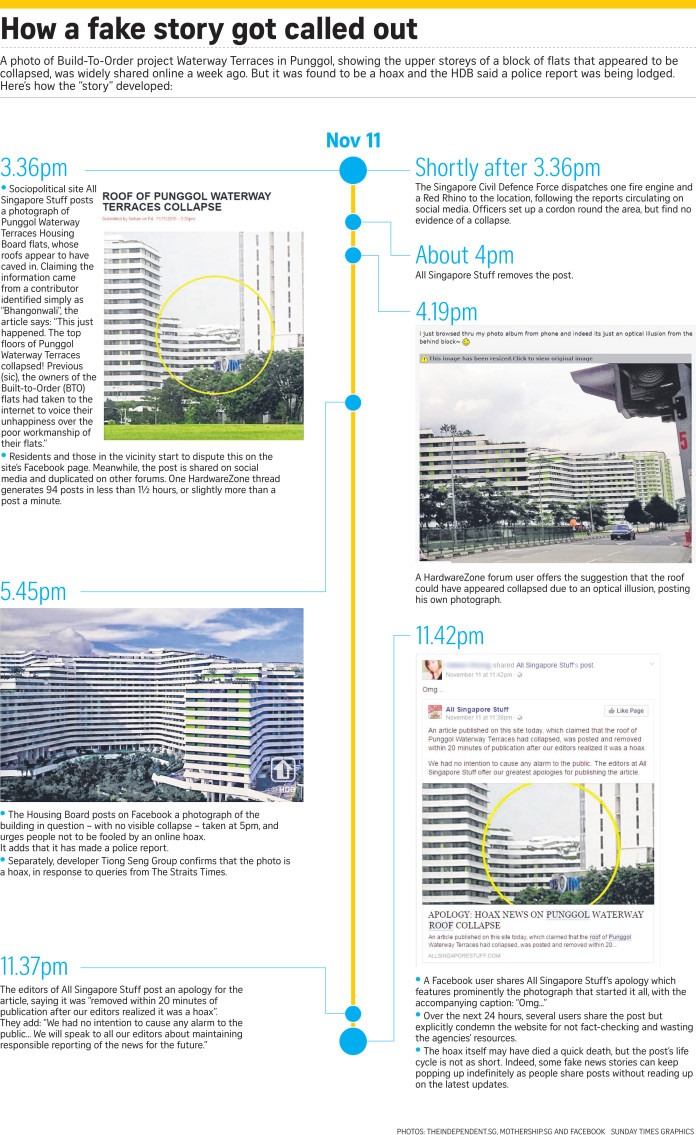During the recent American presidential campaign, the Pope endorsed Mr Donald Trump, Mrs Hillary Clinton sold weapons to terror group Islamic State in Iraq and Syria, and a Federal Bureau of Investigation agent involved in her e-mail leaks case was found dead in an apparent murder-suicide.
The problem with these stories? They were all fake.
Yet, they were among the most popular stories according to Facebook shares, outperforming those of fact-checked, mainstream news.
This has prompted concern that fake news – overwhelmingly weighted in Mr Trump’s favour – had a hand in propelling the Republican nominee to the highest office in the United States.
Fake news is an issue in Singapore too, with several examples catching the attention of the police in the last few years alone.
Just last month, a photograph circulating online, purporting to be of a collapsed roof in a Housing Board block, resulted in a Singapore Civil Defence Force fire engine and one of its Red Rhino vehicles racing down to Punggol Waterway. The photo story turned out to be fake, and the HDB said it would lodge a police report.
Yesterday, a Facebook post was circulated in which the headline of a Straits Times article, on President Tony Tan Keng Yam conveying his best wishes to Thailand’s new King and inviting him to visit Singapore, had been modified.
Some perpetrators distribute bogus news for a lark, and most times it affects just individuals, or in some more serious cases like the Punggol hoax, residents and government agencies.
But on a national level, some types of false news can have exponential consequences.
Illustrating the potential for fake news to cause disruption, Defence Minister Ng Eng Hen said in 2013 that distorted or false information, rumours and smears that surface on the Internet posed a threat to Singapore’s Total Defence efforts. Online misinformation could spread widely during tense or volatile situations, causing confusion and chaos, he said, adding: “Those who would do us harm will purposely start (spreading such misinformation) to weaken our resolve and cause disunity.”
FANNING THE FLAMES
Even before the Internet, there were local cases of news being distorted or snippets of truths being taken out of context – to dire consequences.
False newspaper reports on the custody case of Maria Hertogh, a Dutch Catholic girl whose foster family raised her as a Muslim, inflamed religious sentiments and led to riots in December 1950 that left 18 dead and 173 injured.
The racial riots of 1964, which saw clashes between Malays and Chinese while Singapore was still part of the Federation of Malaysia, are another example. There have been several explanations for what incited the riots, but then prime minister Lee Kuan Yew said hardline activists from the Umno-led Alliance government in Malaysia provoked the riots for political reasons, and that the People’s Action Party (PAP) government was wrongly blamed for starting them.
These rumours, spread by word of mouth, helped spark an angry chain reaction among the different races that eventually led to 36 deaths and 560 people being injured.
The riots prompted the formation of “goodwill committees” to calm tensions and restore communal relations, the precursor to today’s Citizens’ Consultative Committees.
It is no wonder then that Singapore takes seriously any falsehoods and rumours that could affect racial harmony.
Over the decades, enough statutory teeth have been put in place to enable it to take to task anyone who threatens that harmony, though the Internet and its constant evolution keep throwing up new curve balls.
One need only look to the region to see how fake news is deployed to prey on racist sentiments.
In 2014, when then Jakarta governor Joko Widodo was running for the Indonesian presidency, fake news smear campaigns wrongly alleged that he is a Chinese-descended Christian from Singapore, not a Javanese Muslim.
Pictures were put up on social media supposedly of a marriage certificate showing this, and tabloids were distributed to Islamic boarding schools with bogus articles about his background and faith.
Mr Joko had been a front runner but the fake stories saw his popularity ratings dip, though he eventually won the election.
In Singapore, the issue of fake news was thrown into the spotlight with the antics of the now-defunct sociopolitical site The Real Singapore (TRS).
The site, which had as many as 2.6 million visitors a month, thrived on fabricated articles, some of which attempted to sow discord between Singaporeans and foreigners.
A court of law earlier this year found six such stories amounted to sedition – Singapore’s worst case to date. One of the offending articles falsely claimed that a Filipino family’s complaints caused a scuffle between the police and participants at last year’s Thaipusam procession.
The contributor of the original article posted on another website that the allegations made in the TRS piece were untrue. But this did not stop some from making derogatory statements about foreigners when they read the article.
Site founders Yang Kaiheng and his wife Ai Takagi were jailed for eight and 10 months, respectively.
Read also: Facing up to fake news: How to fight back
FAKE NEWS, REAL APPEAL
Around the world, there are fake news websites dedicated to manufacturing hoaxes, propaganda and disinformation.
One motivation is simply money. Such sites deliberately seek to inflame social media, which in turn drives traffic to them, thus attracting advertisers and their dollars. The founders of TRS made at least $500,000 this way, the court heard.
The sheer scale of the false news churned out during the recent US presidential election astonished many – and it was often done for the cash returns.
A report by media outlet BuzzFeed said that more than 100 pro-Trump websites publishing sensational and often false content were being run from a single town in Macedonia, in eastern Europe. Some sites had seemingly believable names such as USConservativeToday.com, DonaldTrumpNews.co and WorldPoliticus.com.
A 17-year-old who ran one of the sites told BuzzFeed that faking news was an “easy way to make money”.
Some Singaporeans encountered – and even shared – election fakery.
One popular hoax post purported to be of a young Mr Trump saying in a People magazine interview in 1998: “If I were to run, I would run as a Republican. They’re the dumbest group of voters in the country.”
In the nation of Georgia, student Beqa Latsabidze, 22, set up pseudo-US political news websites to make money from Google ads by luring people off Facebook pages to him.
Apart from financial gain, other reasons to pump out fake news include the desire to advance a political agenda, or to commit pure mischief.
In the US, it has sparked fears that intelligence agencies in Russia may have meddled in American politics and used fake news to influence the election.
But a combination of factors here makes it harder for Singaporeans to be suckered in by fake political news, argues Nanyang Technological University communications professor Ang Peng Hwa.
For starters, he says that individuals, whether pro- or anti-PAP, are more likely to come across alternative views.
“In the US, people are so touchy precisely because of the strong (political) divide (there).
“But in Singapore, people seem to talk quite freely,” he says.
Another reason is that pragmatic Singaporeans are simply more concerned with bread-and-butter issues like housing or the Central Provident Fund – not so much about the candidates themselves.
Prof Ang says: “When it comes to misinformation about policies, you can be sure that the Government will clarify.
“And when it comes to wrong statements about individuals, there are defamation suits. Because of this, some politicians may take one or even two steps back.”
WHAT LIES AHEAD?
The borderless nature of the Internet and the speed at which it facilitates dissemination of material make it harder for mainstream media to fact-check the deluge.
In March last year, several international news outlets, including CNN and Chinese broadcaster CCTV, prematurely announced the death of former prime minister Lee Kuan Yew after they were taken in by a Singapore teenager’s hoax.
More recently, this newspaper was among several to be affected by the fake news phenomenon.
In a news report last month, it attributed US President-elect Trump’s appointment of billionaire Wilbur Ross as Commerce Secretary to a tweet, allegedly from Mr Ross himself.
Although Mr Trump eventually announced the job offer, the tweet had turned out to be from a hoax account.
As to Mr Trump’s actual election, Facebook chief executive Mark Zuckerberg initially said it was “extremely unlikely hoaxes changed the outcome of this election”.
However, he has since joined Google in pledging to cut off ad revenue to fake news creators.
In terms of the political implications here of fake news, the situation is quite different from the US in that the ruling People’s Action Party won a strong mandate from voters in the last general election – it clinched 69.9 per cent of the vote.
In contrast, although Mr Trump won due to the American system of the electoral college, which is measured on state-by-state results, his actual vote share was 46.2 per cent against Mrs Clinton’s 48 per cent.
As such, in Singapore there is less enthusiasm – or at least a smaller audience – for fake counter narratives.
While Singaporeans seem to be more discerning and less trigger-happy in sharing fake news compared to the early 2010s, MP Zaqy Mohamad thinks that such bogus stories still pose a threat to security and harmony here.
Says Mr Zaqy, who chairs the Government Parliamentary Committee on Communications and Information: “All it takes is one person and one message.
“One bomb threat could cause panic. One comment could create the impression that it’s okay to bash foreigners.
“They add up, and then you may end up with a real situation where people think that such views are common and okay.
“If that’s the case, what becomes of Singapore?”

HOW TO SPOT THE REAL DEAL
The NLB’s S.U.R.E (Source. Understand. Research. Evaluate.) initiative was launched in 2013 as the primary education arm for the National Information Literacy Programme.
SOURCE: Make sure the source of information is credible and reliable.
UNDERSTAND: Know what you’re reading and search for clarity.
RESEARCH: Investigate thoroughly before making a conclusion; check with multiple sources
EVALUATE: Look from different angles – there are at least two sides to a story
SPOTTING BOGUS GOVERNMENT SITES
With fake government websites for phishing scams or pure mischief on the rise, the Government has these suggestions to identify them:
1. E-mails that use a public Internet account
Take a look at the sender’s e-mail address before clicking on any link sent to you via e-mail. Do not trust the e-mail if it was sent via a public account. Singapore government e-mail addresses will end with @[AGENCY NAME].gov.sg.
2. Incorrect URL
A tell-tale sign of a fake website is the usage of incorrect suffixes in the URL of the website. All Singapore government websites end with gov.sg. Many fake government websites will use domain names such as .org or .net.
3. Site is not secure
Legitimate websites use encryption to help ensure your payment information remains safe. Look for a lock symbol in the browser window. The address should also start with “https://” rather than “http://”. Do not enter payment information on any site that isn’t secure.
4. Grammatical errors
Watch out for poor English or grammatical errors as this could mean that the site is not genuine and was put together quickly by someone looking to make a quick profit.
5. Low-resolution images
Scammers usually put up fake sites quickly, resulting in poor-quality websites. If a ministry logo or text appears to have poor resolution, this could be a clue that the website should not be trusted.

This article was first published on Dec 04, 2016.
Get a copy of The Straits Times or go to straitstimes.com for more stories.







